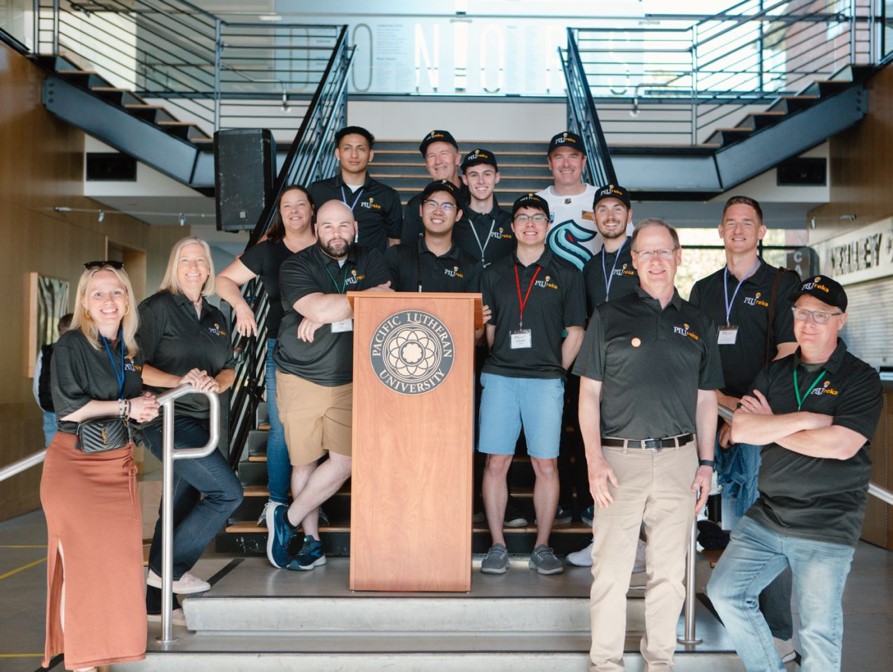Minor Requirements
Innovation Studies minors must complete a minimum of 20 credit hours in the following key areas:
- Introduction to Innovation Studies (4 credits)
- Innovation Principles (8 credits)
- Elective (4 credits)
- Innovation Seminar (4 credits)
Innovation Studies minor requirements are listed in the PLU Catalog and described below.

Program Details
Students are expected to work closely with Innovation Studies faculty advisors to ensure the most personalized programs and instruction possible. In addition, outside-the-classroom activities and events form an important part of this interdisciplinary minor, which emphasizes teamwork, leadership, and collaborative problem solving. These activities include craft and design events in the Innovation Studies Makerspace in Hinderlie Hall, innovation-themed lectures, and off-campus field trips.
All courses counted toward the minor must be completed with grades of C- or higher and with a cumulative GPA of 2.5 or higher in those courses.
Students may transfer in a maximum of 8 semester hours toward the Innovation Studies minor, unless they have permission from the program chair.
Up to eight (8) approved credits from a supporting major or minor can be applied to the Innovation Studies minor for “double dip” credit.
At least Junior status is required before students take the concluding Innovation Seminar (and Senior status is recommended). This requirement encourages students to be well along in their major before taking the final seminar.
Curriculum
If you’ve taken a Principles, Elective, or Introduction to Innovation course in the past, it counts for the minor, even if it wasn’t declared first. This document presents a 4-year plan about when the Intro, Principles, and Seminar courses will be offered.
Students can complete curriculum requirements in any order, and pathways into the program overlap with many majors and minors on campus. (See Sample Minor Plans for several interesting examples.) The only requirement is that the Innovation Seminar (INOV 350) may not be taken until the Introduction to Innovation Studies and Innovation Principles coursework is complete.
1) Introduction to Innovation Studies
Four Semester Hours
Students select four credits from the following five courses to receive an introduction to the discipline of Innovation Studies and key themes in the program.
- HIST 121 – History in Video Games – CX (4), offered Spring 2026
Surveys the social and cultural impact of video games in society, including how historical figures and events have been represented in popular games. Combines the study of visual media theories and the creative process with social and political issues in gaming, including ethical behavior, violence, gender, ethnicity, religion, and environmental concerns.
- COMA 248 — Innovation, Ethics, and Society (4), offered Fall 2024
- HIST 248 – Innovation, Ethics, and Society ES (4), offered Fall 2025
- PHIL 248 – Innovation, Ethics, and Society (4), offered tbd
Three courses covering a history of innovation, problem solving, and creativity in the global economy, emphasizing the ethical considerations that arise as a result of new products and initiatives, disruptive technologies, globalization, and cultural change. Students may take any 248 section. Each emphasizes clear writing and communication practices, teamwork, and building an ethical vocabulary for business and entrepreneurial activity.
- HIST 346 – History of Innovation and Technology – ES (4), offered Spring 2024, Spring 2027
Surveys the role of innovation and technology in Western societies from the Industrial Revolution to the computer age. Examines the way that innovative technology has developed over time, and how those changes have affected business and the economies of Europe and the United States. Emphasizes clear writing and communication practices, teamwork, and building an ethical vocabulary for business and entrepreneurial activity.
2) Innovation Principles
Eight Semester Hours
Students select four credits from two of the three Innovation Principles subject areas below to anchor their understanding of innovation in an interdisciplinary framework. Courses must be completed before taking the Innovation Seminar.
Note: If possible, students should take courses outside of their major or minor program areas to maximize interdisciplinary connections. For example, an Art & Design major or minor should consider selecting 8 hours from Economic principles, Business principles, and Communication principles to expand their interdisciplinary knowledge. However, up to 8 credits can be co-enrolled (double-dipped) between the Innovation Studies minor and other majors or minors on campus.

Economic principles (4 credits from the following):
- ECON 101: Principles of Microeconomics
- ECON 111: Principles of Microeconomics: Global and Environmental
Business principles (4 credits from the following):
- BUSA 201: Introduction to Business in a Global Environment
Design and Communication principles (4 credits from the following):
- ARTD 110: Graphic Design 1- An introduction to design through the study of basic techniques, color theory, and composition.
- COMA 215: Writing in Communication Careers- Introduces students to the fundamental standards and expectations in communication writing.
(3) Elective
Four Semester Hours
Select at least one course from the following list of electives for deeper study in the process of innovation, creativity, problem solving, and related proficiencies.
Note: The courses in this list emphasize problem solving and creativity from a disciplinary perspective. Some courses relate to the cognitive processes of innovation or innovation in historical or ethical perspective; others pertain more directly to stages of the innovation process or professional skills considered useful in teams charged with bringing new ideas or products to market.
- ARTD 202: 3D Design– Develop an understanding in three-dimensional design with an emphasis on spatial awareness, problem-solving, and the many varieties of sculptural form.
- ARTD 310: Graphic Design 3– Design and execution of printed materials; emphasis on technical procedures and problems in mass communication.
- BUSA 340: Non-Profit Management– Operating strategies and organizing principles of nonprofit entities; management and leadership challenges unique to the sector such as HRM strategies and accountability mechanisms, working with volunteers, fundraising, ethics, and legal issues.
- BUSA 358: Entrepreneurship– Intensive study of issues and challenges associated with start-up, growth, and maturation of a new enterprise.
- COMA 361: Strategic Communication- Introduces the theories, methods, and practice of public relations. Emphasizes technical and analytical skills.
- DATA 133: Introduction to Computational and Data Science– Introduction to computer programming and problem-solving using real datasets from a variety of domains such as science, business, and the humanities. Introduces the foundations of computational thinking, modeling and simulation, and data visualization.
- CSCI 144: Introduction to Computer Science– An introduction to computer science including problem solving, algorithm design, object-oriented programming, numerical and non-numerical applications, and use of data files. Ethical and social impacts of computing.
- ENG 323: Writing for Public and Professional Settings– Students working in professional settings analyze the rhetorical demands of their job-related writing.
- HIST 121: History in Video Games– Surveys the social and cultural impact of video games in society, including how historical figures and events have been represented in popular games.
- HIST 247: U.S. Capitalism: From Railroads to Netflix– American business and the economy from the rise of big business and labor unions after the American Civil War through the era of globalization. Topics include technological change, business organization, business ethics, and the place of women and minorities in American business society.
- PHIL 225: Business Ethics Application of moral theories and perspectives of relevance to business practices. Examination of underlying values and assumptions in specific business cases involving, e.g., employer-employee relations, advertising, workplace conflict, and environmental and social responsibilities.
- POLS 345: Government and Public Policy- An integrated approach to the nature of public policy, with emphasis on substantive problems, the development of policy responses by political institutions, and the impacts of policies.
- PSYC 148: Minds, Brains and Computers, Introduction to Cognitive Science– Offers a broad overview of cognitive science, a multi-disciplinary approach to the study of the mind, combining insights from philosophy, neuroscience, math and computer science, linguistics, and experimental psychology.
- PSYC 448: Cognitive Psychology– The study of human thought. Topics include attention, perception, memory, knowledge and concept formation, language, problem-solving, and reasoning.
(4) Innovation Seminar
Four Semester Hours
- INOV 350 — Innovation Seminar (4)
A hands-on seminar for INOV minors designed to expose students to the conceptual, ethical, and logistic issues involved in developing and presenting an innovative idea, process, product, or campaign. Students will form teams; analyze artistic, technological, and entrepreneurial factors; consider issues such as feasibility and market timing; and then develop and present an “idea proposal” during the semester that will have written and visual components. A final presentation is required.
Offered each Spring term.
Prerequisite: Junior standing or permission of instructor.
Recommended preparation: Introduction to Innovation Studies (HIST 121, HIST/PHIL 248, or HIST 346), and two of the following Principles: Business Principles (BUSA 201), Economics Principles (ECON 101), or Communication & Design Principles (ARTD 110 or COMA 215).
Declaring the Minor
Current PLU students may declare the Innovation Studies minor with Director Junichi Tsuneoka or through a selection of department chairs and advisers. For example, Business majors may declare their minor through Amy Stewart-Mailhiot (stewarae@plu.edu) in the School of Business. History majors or minors may declare with Professor Michael Halvorson.



